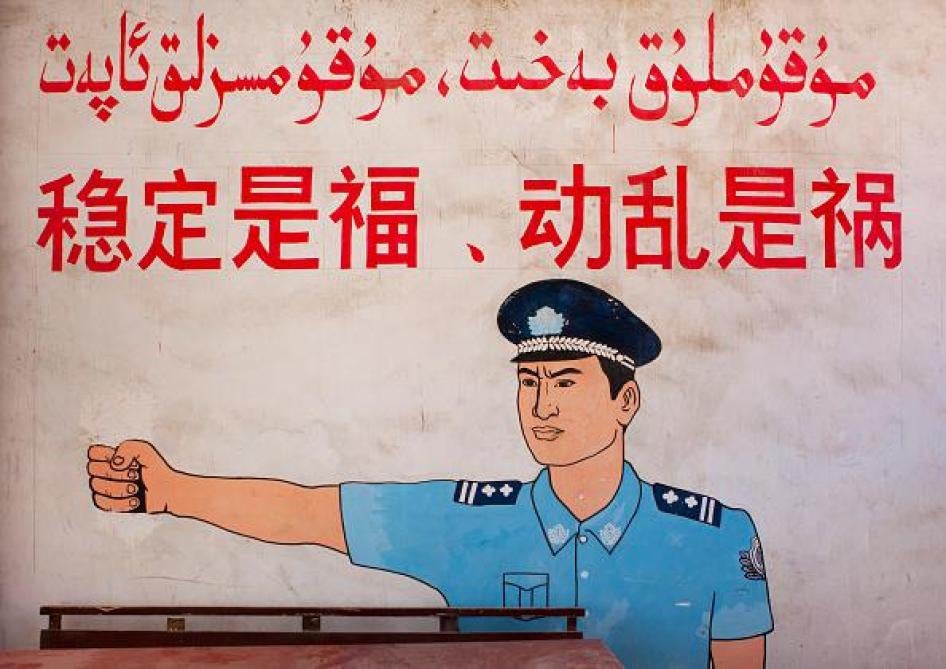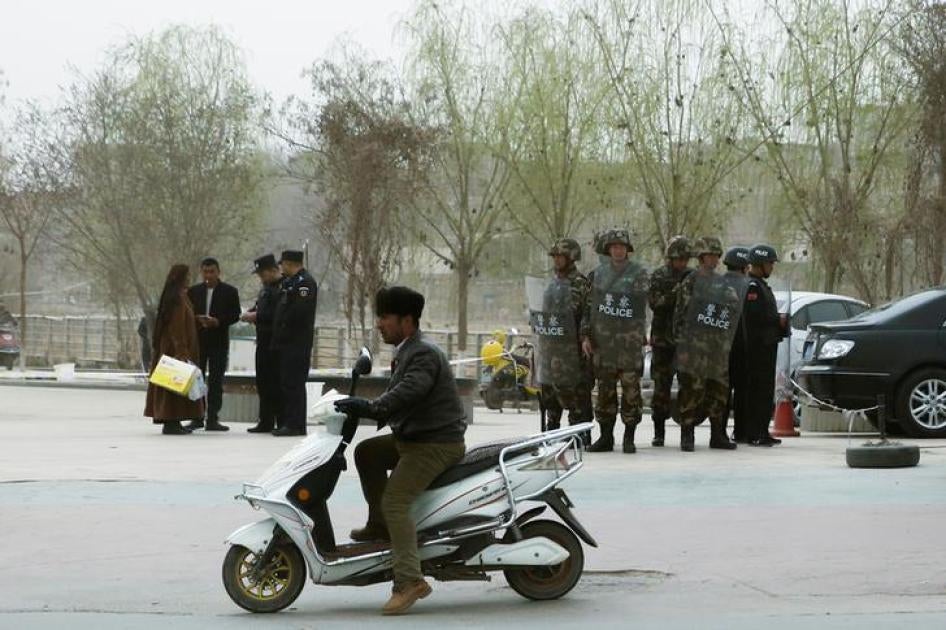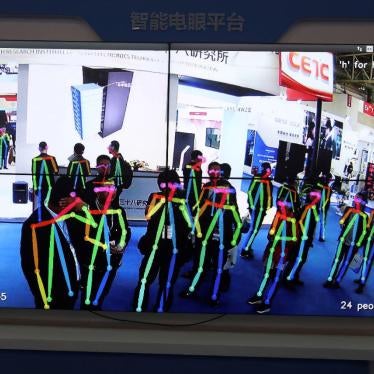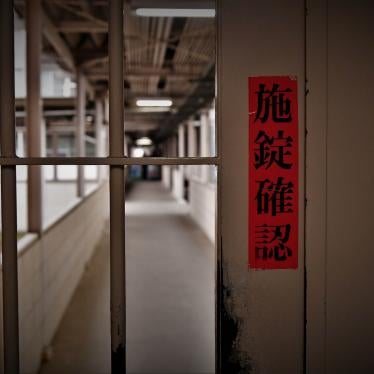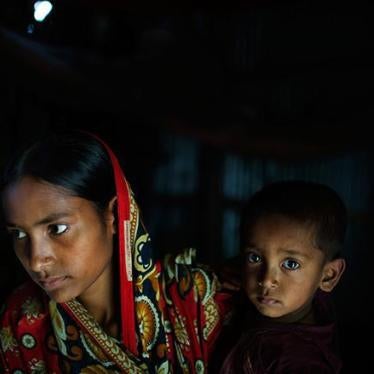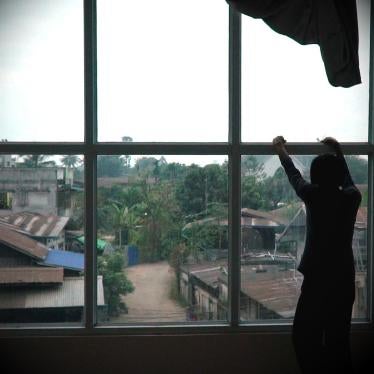(ニューヨーク)― 新疆ウイグル自治区の中国政府当局が、12歳〜65歳の全地域住民のDNAサンプル、指紋、虹彩スキャン、血液型を採取している、とヒューマン・ライツ・ウォッチは本日述べた。この動きは、生体認証データの提出を新疆の旅券申請者に限っていたこれまでの政府の動きを大きく上回り、その収集が大幅に拡大されたかたちだ。
体制の安定を脅かすと当局が考えているすべての「要注意人物(focus personnel)」とその家族は、年齢に関係なく生体認証データを採取される。当局はさまざまな方法でこうしたデータを収集している。DNAサンプルと血液型は、毎年無料で行われている健康診断プログラム「Physicals for All」にて収集。検診の参加者が、重要な個人情報であるなDNAデータの採取・保管を告知されているか否かは不明だ。
ヒューマン・ライツ・ウォッチの中国部長ソフィー・リチャードソンは、「新疆当局は、インフォームドコンセントと選択の自由がないとみられるこれらプログラムの名称を『Privacy Violations for All』に変えるべきだ」と述べる。「DNAを含む全住民の生体認証データの強制的な蓄積は、国際人権規範のはなはだしい違反行為であり、無償の医療プログラムにみせかけて秘密裏に行われているとすれば、なおさら問題だ。」
「住民の正確な登録および検証に関する[新疆ウイグル自治]区域作業ガイドライン(全区人口精准登记核实工作指南、「全住民登録プログラム」)」という公式文書は、新疆アクス市のウェブサイトですべて閲覧可能で(非公式の英語翻訳版は下記参照のこと)、生体検証の採取スキームを詳述している。
ガイドラインに日付はないが、アクス市自治体が下級職員に告知した日付は2017年7月2日となっている。国営メディアの報道によると、新疆政府は、2017年2月に全住民登録プログラムを承認。「段階的に」実施とされている。例えばタルバガタイ地区のある自治体は、2017年6月中旬から生体検証データの採取を開始し、同年11月までに終わらせるとしている。新疆全域にまたがる「Physicals for All」プログラムは2017年7月頃から始まり、10月に完了した。
当該ガイドラインは、地域の「住民サービス・管理および実名登録作業リーダーシップ委員会(自治区人口服务管理和实名制工作领导小组办公室)」が発行した。この事務所がどの官庁に属しているのかはっきりしていないが、「住民管理」は通常、警察の管轄下にある。
当局は住民登録プログラムについて、貧困緩和、管理改善、および「社会の安定性」を促進する「科学的意思決定」のためのものであるとしている。当局は2016年から毎年「Physicals for All」プログラムを提供しており、 比較的貧しい地域に利するものとしていた。公表されているプログラムの目標は、保健当局によるサービスの提供を改善、主な疾病をスクリーニングのうえ発見、全住民の健康状態をデジタル記録することにある。「Physicals for All」に関するメディア報道には、過去に診断されなかった病気の治療を受けたり、命が救われたという参加者の証言が含まれている。
ガイドラインによると、さまざまなタイプの生体認証データ収集をそれぞれ異なる当局が担当している。党の幹部や警察官は、個人宅を訪問したり、中央収集地点を設置し、この目的で設計されたモバイルアプリを使用して、住民の写真や指紋、虹彩スキャン、および「世帯登録」(戸籍—hukou)情報を集める責任を担う。地方の公衆衛生当局は、「Physicals for All」の一環としてDNAサンプルと血液型情報を収集。 血液型情報は直接警察に送られ、「DNAサンプル採取用血液カードは、県の警察局に送られてプロファイリングされる。」これら情報はすべて個人の国家ID番号とリンクされたうえ、保管されている。
ガイドラインでは、生体検証データの収集は包括的なものとされている。担当職員が「各村すべての世帯[からの情報]、各世帯の全員、各個人の全アイテムを確保しなければならない」とする。住民が採取を断る選択があるとは示されておらず、インフォームドコンセントの義務についても記載がない。
「Physicals for All」に関するメディアの報道や公式の実施文書には、超音波、心電図、「定期的な血液検査」など、さまざまな医療検査が並んでいるが、検査の一環としてDNAサンプルが採取される旨はどこにも記載されていない。また政府は、採取した医療情報をどのように利用し、共有するか、あるいはどのくらいの期間保存するかについて、一般または参加者に対し全面開示していない模様。 国営メディアの報道では、「Physicals for All」プログラムへの参加は、自主的でなければならない点が強調されているが、実際には全員参加が期待されており、時に参加への圧力がかかることもあるとみられる。
新疆西部のカシュガル地区で開催された2016年の「Physicals for All」プログラムに参加したウイグル系住民の1人は、隣組委員会が「健康診断には[近隣住民全員が]参加しなければならない」と求めてきたという。彼自身も参加しないという選択があるとは思えず、「参加しないことは『思考問題』の兆候」、つまり「政治的な不忠」の表れと確実にみなされただろうと話した。抑圧的な体制下では危険なレッテルだ。彼は、公衆衛生当局が診断結果を知らせてくることはなかったと語った。
前出のリチャードソン部長は、「中国にはしっかりしたプライバシー保護策がほとんどなく、ウイグル系住民は、厳重な治安部隊の駐屯、多数の検問所、『国家転覆的なコンテンツ』をチェックするためのスマートフォンの定期検査など、かなりコントロールと監視の対象となっている」と指摘する。「こうした文脈から、強制的な生体検証データの収集は、とりわけ人権侵害的な可能性を秘めており、かつ治安措置として正当化できる理由が全くみえない。」
イリ地区の公衆衛生当局は2017年10月の報告で、政府は「健康診断に参加すべき人びとが確実に参加するようにしなければならない」としている。イリ・イブニングポスト紙の2017年6月付の報道では、「健康診断に参加したがらない人びとのために[中略]、党幹部は参加を促すため奮起[中略]しなければならない」と報じられており、参加を拒否した住民には、関係者が圧力をかける可能性を示唆している。こうした実施方法は、医療検査といった医療介入を、無償かつインフォームドコンセントを前提にすることを義務づける国際人権規範に準拠していない。
2017年11月1日付の新華社通信の記事によると、2017年の当該プログラム参加者は、1,880万人に上る。
当該ガイドラインは、生体認証データの収集が永久的な措置であることを示唆している。現在は新疆に住む全ての人が、たとえば公立学校への入学や旅券の申請といった「戸籍関連」のすべての手続きに際して、こうしたデータを提出するよう、警察が確実に監督することになっている。新疆の戸籍をすでに持ちながら、自治区外に住んでいる人びとでさえ、「本土新疆住民サービス管理委員会(the Xinjiang Population Services and Management Committee(s) in the Mainland)」にこうした情報の提出が義務づけられている。
グルジャ県、タルバガタイ地区、新疆の一部である鉄門関市、コルラ市、精河県など、新疆ウイグル自治区にちらばる数々の地方自治体が、生体認証データ収集に関する地方版の指示を発行。イリ地区とタルバガタイ地区の指示は、主に地方政治レベルでガイドラインをそのまま生かすものだ。 一方、鉄門関市では、DNAサンプルの採取が14歳〜65歳に限定されている。加えて、宣伝当局に対し、生体検証データの収集に関する「インターネット上の民衆感情を監視」および「ネガティブな情報の指導・対応」の任務を与える内容となっている。
ヒューマン・ライツ・ウォッチは、新疆警察が2016年9月、多数のDNAサンプルを手続きし、プロファイリングするための大規模なインフラを構築するためとみられるDNAシーケンサーの入札発表をしたことをまとめている。
その後のフォローアップ調査で、米企業サーモ・フィッシャー・サイエンティフィック(Thermo Fisher Scientific)社が新疆警察にDNAシーケンサーの一部を供給したことが明らかになった。ヒューマン・ライツ・ウォッチは、2017年6月と8月に同社に宛てた書簡で、同区ほか中国全土で、政府が犯罪の被疑者ではない個人からDNAサンプルを採取していることを伝えた上で、同社の人権に関する方針やDNAシークエンサーの使用目的を中国当局と協議したかなど、様々な問題に対するコメントを求めた。同社は最初の書簡への返答で、「顧客または購入に関する情報は外部と共有せず」、「事業のグローバルな性質を考慮したとき、すべての製品の使用や適用を監視することは不可能だ」と回答。「すべての顧客が、適切な規制および業界標準のベストプラクティスに従って行動することを望む」とした。同社は、2通目のフォローアップ書簡には回答していない。
サーモ・フィッシャー・サイエンティフィック社のようなDNAシーケンシングや関連機器を供給する企業は、政府による人権侵害の共犯とならないよう、人権保護責任を有している。同社も速やかに自社製品の誤った使い方を調査すべきであり、そうした調査が行われるまで、中国への製品の販売およびサービスの提供を一時停止すべきだ。
ヒューマン・ライツ・ウォッチはまた、反体制派や移民を含む4,000万人分の検索が全国規模で可能な、中国警察のDNAデータベースについても調査・検証している。データベースにより、警察が正確なマッチだけでなく、関係者の家族も検索することができるため、差別的なプロファイリングにつながる可能性を秘めている。
血液サンプルを強要したり、インフォームドコンセントや正当な理由もなしに採取することは、個人のプライバシー権、尊厳、身体的不可侵性の権利を侵す可能性があるうえ、一定の条件下では、品位を傷つける取扱いに該当する場合もある。治安維持の目的で、ある地域全体や全住民のDNAサンプルを採取することは重大な人権侵害であり、その必要性や程度の適正は認められない。
医療情報の守秘尊重への権利は、健康権の中核的原則でもある。国連の「経済的、社会的及び文化的権利に関する委員会」(CESCR)は、「[すべての]医療施設、財貨、サービスは守秘義務を尊重するために設計されていなければならない」と各国に勧告している。プライバシー権は守秘義務の絶対ルールを確立するものではないが、守秘義務の干渉または違反は、厳格に正当性を示さなければならず、警察やその他の政府機関がデータベースにアクセスできる状態で、定期的に共有することを意図した健康情報の収集はこれに当たらない。
DNAデータは非常にセンシティブな情報であり、同意なしに共有されると、さまざまな人権侵害が容易に起きてしまう可能性が高い。政府による強制的な収集や使用は、プライバシー権の重大な侵害だ。政府によるDNAサンプルの採取は、許可された捜査ツールとして時に正当化されることもあるが、このようなプライバシー権の侵害は、包括的に規制され、範囲の狭い、正当な治安維持目的にみあったものでなければならない。しかし、本報告書で詳述されたプログラムは、何らかの形で犯罪捜査に関係しているかどうかは関係なしに、すべての個人からDNAサンプルを採取しているのであり、インフォームドコンセントも、DNAサンプルが求められている理由の説明も義務づけられていないとみられる。虹彩スキャンなどのセンシティブな生体認証データの強制かつ過剰な収集は、そのようなデータの保管・使用に関する重大な人権上の懸念となっている。人種、宗教、意見ほか言論の自由の行使が理由で個人が監視されるなど、公開されることのないデータが、人権侵害的な潜在性を秘めた目的のために使われる可能性がある。
中国北西部の新疆ウイグル自治区には、1,000万人のウイグル民族をはじめ、大半がイスラム教徒である少数民族が暮らす。中国政府は、信教の自由を含む基本的人権に対し広範な制限をかけている。2016年8月にChen Quanguo党委員会書記が任命されて以来、外国旅行の制限や国外留学生の強制帰還、政治教育施設へ数千人を拘禁、住民監視のための治安部隊要員を数千人規模で雇用など、さらに抑圧的な政策を実施している。当局はまた、顔認識のようなその他の生体認証技術を監視システムと統合するなどして、監視措置を強化している。 この他にもヒューマン・ライツ・ウォッチは、中国全土でビッグデータやクラウドコンピューティング、生体認証などを用いて、大規模監視のための新テクノロジー・システムを実現させる当局の取り組みについて調査・検証している。
リチャードソン部長は、「中国当局は、人びとを顕微鏡の上に置くことで、『社会の安定』を達成できると考えているようだが、こうした人権侵害的プログラムは、政府に対する敵意を強めるだけの可能性が高い」と指摘する。「中国政府は直ちにこれらのプログラムを停止し、完全なインフォームドコンセントもなしに集められたデータをすべて破棄すべきだ。」
「住民の正確な登録および検証に関する[新疆ウイグル自治]区域作業ガイドライン」の非公式の英語翻訳は以下をご覧ください。
The [Xinjiang Uyghur Autonomous] Region Working Guidelines on the Accurate Registration and Verification of Population
These guidelines are based on “The [Xinjiang Uyghur Autonomous] Region Working Plan on the Accurate Registration and Verification of Population” and are written to systematically and scientifically promote the work of Accurate Registration and Verification of Population, and to accurately verify Xinjiang’s actual population data and to collect multidimensional biometrics information.
- Target Mission
The main goal is to fully and accurately verify the real number of Xinjiang’s population, to collect the images, fingerprints, iris scans, blood types, and DNA biometrics of those between the age of 12 and 65. For “focus personnel” and their immediate families, such information must be collected from everyone regardless of age. Regulating the management of identification cards is the foundation to creating a basic population database, based on one’s ID numbers, for the autonomous region. [This will also] realize the exchange of population information across government agencies, and achieve precise identification and real name registration management.
- Work Responsibilities
i. All prefecture and city governments should follow the general requirements set out by the regional government, to develop implementation plans and to prepare human, physical, and financial resources to ensure the [implementation of] the work. All county governments will be responsible for carrying out the policy by developing specific measures and by leading and coordinating the work.
ii. All township governments and neighborhood committees are responsible for organizing the personnel responsible for verifying household registration (hukou) information and collecting biometric data.
iii. All county governments, township governments, and neighborhood committees should provide training to staff on verification work and require them to be certificated.
iv. Village and neighborhood Party branch, Party cadres of the “Visit, Benefit and Gather” (访惠聚) program, and police station will form a joint team, led by the village or neighborhood committee’s first Party secretary (for those without a first secretary, the village or neighborhood committee’s Party branch secretaries should be responsible), to carry out the tasks of verifying hukou information and the collection of biometrics using home visits and in a centralized manner.
- Work Requirement
i. Protect people’s legal rights, guide them to cooperate, and support the work of Accurate Registration and Verification of Population.
ii. Organize meticulously and carefully make arrangements to ensure that the hukou information for everyone in every household, in every village is completely verified in Xinjiang. No one is to be missed.
iii. The principle of biometric collection is to proceed from easy to difficult, to promote it from pilot areas, from villages to towns, and from focus personnel to the ordinary masses. The goal is to collect information where information should be collected, and to collect as much data as possible.
iv. Strictly enforce the requirements of the Working Guidelines. To accurately collect biometric data, ensure that the collected biometrics match with the personal information [of the right person].
v. The principle is whoever collects the information, that person should be responsible; whoever inputs the information, that person should be responsible; whoever manages the information, that person should be responsible. After collecting and verifying the information, the staff must sign their names in the documents to ensure the quality of the collected information and to strengthen responsibility and accountability.
vi. Staff responsible for verifying information are not to fabricate, or to tamper with the collected data, nor to share data with outside sources or otherwise leak data unless legally authorized.
vii. In areas that do not have mobile network coverage, staff can record data on paper or temporarily store the information on mobile devices. When the situation allows, log onto the relevant platforms and databases to upload the data.
viii. After a long-term data collection system is established and the work of verifying and registering population information has been started in a comprehensive manner, when police agencies handle any hukou-related matters, they should first check to see if biometrics have been collected. Any missing or incomplete information should first be collected before any hukou matters can be conducted.
- Rules on Hukou Information Verification and the Collection of Multidimensional Biometrics Information
i. Verifying the Hukou Information of Individuals
- Staff conducting verification work will use handheld devices and log on to Accurate Registration and Verification of Population platforms using previously given account information. They will key in the identification numbers of those registered in the administrative area to generate information collection charts for [each] individual.
- Staff should verify the name, gender, ethnicity, date of birth, ID number, education level, employer information, and other information of the individual.
ii. Collecting Multidimensional Biometric Data
- Multidimensional biometric data includes: images, fingerprints, iris scans, blood types, DNA samples, and others.
- The collection of biometrics, like images, fingerprints, and iris scans can be done by visiting individual households with biodata collection equipment, or by setting up central collecting points based on geographic and population distribution.
- The collection of biometrics like blood types and DNA samples should be carried out by county (city and district level) Health and Family Planning Bureaus at the basic levels as part of the Physicals for All Programs, to ensure the professional collection of blood type and DNA blood cards. The blood type information should be sent to the county level police bureaus while blood cards [for DNA collection] should be sent to the county police bureaus for profiling.
- Handling Various Situations When Verifying Hukou Information
i. While verifying hukou information, for errors found in the main items (name, gender, ethnicity, date of birth, ID number), the staff should inform the person to bring supporting documents to make corrections at their local police station. Errors found in the supplementary items (education level, employment) can be edited by police officers after gathering supporting documents on the spot, and logging onto the Accurate Registration and Verification of Population platform.
ii. When verifying the information of people who have moved away from the areas where their hukous are registered, if any mismatched information is found between the information they provided and the information on the Accurate Registration and Verification of Population platform, inform the individuals to go back to the police station where their hukou is registered to make the amendments.
iii. For the migrant population in Xinjiang, register their information according to the relevant requirements for the management of migrant population, verify their hukou information, and through the Accurate Registration and Verification of Population platform, report the verification results and the status of their biometric collection to the local police stations where their hukous are located for examination and approval.
iv. For those without hukous, input their hukou information according to the requirements, collect their photos, biometric data, and then inform them or their guardians to report, within a certain time limit, to the police station in their area of residence or where they were born to process their hukou registration according to the relevant policies concerning people without hukous.
v. For those whose information cannot be verified on the spot, after collecting their pictures and multidimensional biodata, report their situation to the police station in the areas where they said their hukous are located, and the latter will verify their information. If verified, connect their biometric data with their hukou information. If not verified, make a note on the data collecting system and try to match it later.
vi. For migrant populations whose hukou is located outside of Xinjiang, register them according to the relevant regulations concerning the management of migrant populations.
- The Collection and Verification of Information for those with Xinjiang Hukous but Living in the Mainland
The work of verifying hukou information and collecting biometrics of those with Xinjiang hukous but living in the mainland is the responsibility of the local offices of the Xinjiang Population Services and Management Committees in the mainland and of the local people’s governments entrusted by the Xinjiang government. The Xinjiang Population Services and Management and Real-Name Registration Work Leadership Committee is responsible for the training of personnel, distribution of equipment, and the launching of special accounts for Accurate Population Registration and Verification.
